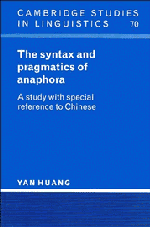Book contents
- Frontmatter
- Contents
- Preface
- Abbreviations used in glosses
- 1 A neo-Gricean pragmatic theory and anaphora
- PART I ANAPHORA IN GOVERNMENT AND BINDING THEORY
- 2 Empty categories
- 3 Control
- 4 Long-distance reflexivisation
- PART II THE PRAGMATICS OF ANAPHORA
- Notes
- References
- Index of names
- Index of languages
- Index of subjects
3 - Control
Published online by Cambridge University Press: 23 October 2009
- Frontmatter
- Contents
- Preface
- Abbreviations used in glosses
- 1 A neo-Gricean pragmatic theory and anaphora
- PART I ANAPHORA IN GOVERNMENT AND BINDING THEORY
- 2 Empty categories
- 3 Control
- 4 Long-distance reflexivisation
- PART II THE PRAGMATICS OF ANAPHORA
- Notes
- References
- Index of names
- Index of languages
- Index of subjects
Summary
Introduction
In the last chapter, I showed that zero anaphors in Chinese do not fit into Chomsky's typology of ECs. In this chapter, I shall demonstrate that control in Chinese cannot be adequately accounted for under either a syntactic or a semantic approach.
Control is defined here in a relatively theory-neutral way as a relation of referential dependence between an unexpressed subject (called a controllee) and an argument (called a controller) (usually) in the minimal matrix clause (e.g. Bresnan 1982a, Mohanan 1983, Andrews 1985, Farkas 1988). Defined thus, control appears to have two essential properties (one syntactic and one semantic): the syntactic one being the omission of the controllee, and the semantic one being the referential dependence between the controller and the controllee.
Control in Chinese enjoys a great freedom in interpretation. More specifically, it exhibits a number of distinctive properties. First, although there is in general a distinction between subject- and object-control verbs, there are verbs that allow either subject or object control, and there are even verbs that sometimes prefer subject control and sometimes prefer object control – depending on context and world knowledge. Secondly, Chinese allows – rather freely – remote or long-distance control, control from a non-immediate, higher clause or from prior discourse. Thirdly, in an object-control construction, the direct object controller sometimes can be dropped, contrary to Bach's Generalisation (Bach 1979). Fourthly, control in Chinese can be done by way of split antecedency, that is, ‘jointly’ by two arguments, each of which bears a distinct θ-role.
- Type
- Chapter
- Information
- The Syntax and Pragmatics of AnaphoraA Study with Special Reference to Chinese, pp. 58 - 74Publisher: Cambridge University PressPrint publication year: 1994



